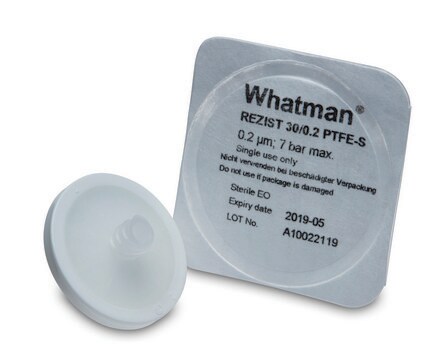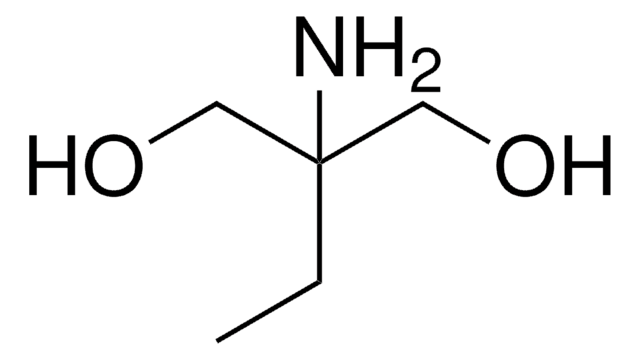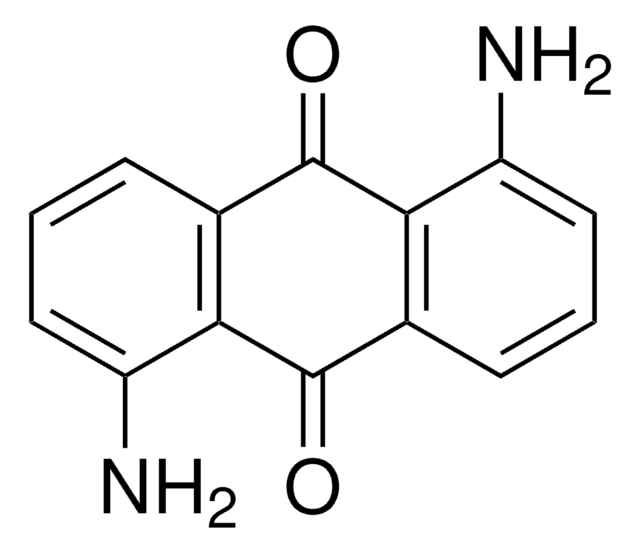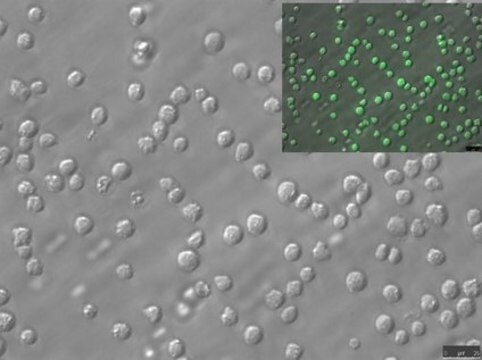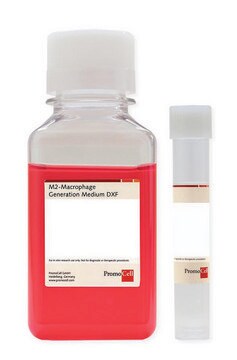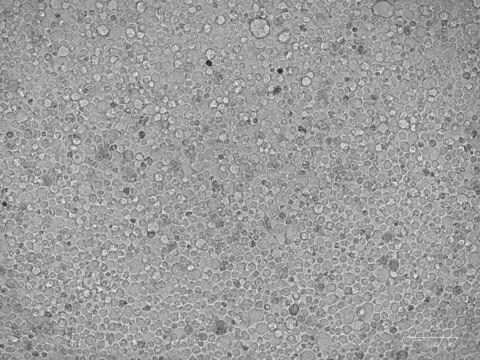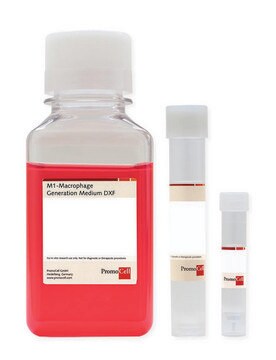6906-50A
Human Peripheral Blood Monocytes: HPBM
Synonym(e):
HPBM, HPBM cells
Anmeldenzur Ansicht organisationsspezifischer und vertraglich vereinbarter Preise
Alle Fotos(1)
About This Item
UNSPSC-Code:
41106514
NACRES:
NA.81
Empfohlene Produkte
Biologische Quelle
human peripheral blood
Form
liquid
Verpackung
pkg of 5,000,000 cells
Hersteller/Markenname
Cell Applications, Inc
Wachstumsmodus
Suspension
Methode(n)
cell culture | mammalian: suitable
Versandbedingung
dry ice
Lagertemp.
−196°C
Allgemeine Beschreibung
Lot specific orders are not able to be placed through the web. Contact your local sales rep for more details.
Human Peripheral Blood Monocytes (HPBM) provide a useful in vitro tool for studying various aspects of pathology and biology. Our CD14+ Monocytes are isolated and purified from human peripheral blood of healthy donors and cryopreserved immediately after isolation.
HPBM are the precursors of tissue macrophages and dentritic cells and are central to immunological responses, including cell-mediated cytotoxicity and production of inflammatory mediators. The CD14 monocyte subset expresses a component of the lipopolysaccharide (LPS) receptor complex, are large with diameter of ~18 um, represent ~80%–90% of circulating monocytes, and express higher levels of CD62L (L-selectin) and CD11b (also referred to as Mac-1 or CR3) and lower levels of MHC class II than do CD16+ monocytes.
Human Peripheral Blood Monocytes (HPBM) provide a useful in vitro tool for studying various aspects of pathology and biology. Our CD14+ Monocytes are isolated and purified from human peripheral blood of healthy donors and cryopreserved immediately after isolation.
HPBM are the precursors of tissue macrophages and dentritic cells and are central to immunological responses, including cell-mediated cytotoxicity and production of inflammatory mediators. The CD14 monocyte subset expresses a component of the lipopolysaccharide (LPS) receptor complex, are large with diameter of ~18 um, represent ~80%–90% of circulating monocytes, and express higher levels of CD62L (L-selectin) and CD11b (also referred to as Mac-1 or CR3) and lower levels of MHC class II than do CD16+ monocytes.
Ursprung der Zelllinie
Blood
Anwendung
Immune system dysfunction. Immunological responses, cell-mediated cytotoxicity, production of inflammatory mediators, hematopoiesis, myeloid differentiation, lipopolysaccharide (LPS), receptor complexes, CD62L (L-selectin), CD11b (Mac-1 or CR3), MHC class II.
Verpackung
Immediately after isolation, 5,000,000 cells in DMEM containing 45% FBS & 10% DMSO.
Komponenten
DMEM containing 45% FBS & 10% DMSO
Qualität
Each lot was tested for proper morphology, CD14 positive selection, Negative for HIV, Hepatitis B, Hepatitis C
Haftungsausschluss
RESEARCH USE ONLY. This product is regulated in France when intended to be used for scientific purposes, including for import and export activities (Article L 1211-1 paragraph 2 of the Public Health Code). The purchaser (i.e. enduser) is required to obtain an import authorization from the France Ministry of Research referred in the Article L1245-5-1 II. of Public Health Code. By ordering this product, you are confirming that you have obtained the proper import authorization.
Lagerklassenschlüssel
10 - Combustible liquids
WGK
WGK 3
Flammpunkt (°F)
Not applicable
Flammpunkt (°C)
Not applicable
Hier finden Sie alle aktuellen Versionen:
Analysenzertifikate (COA)
Lot/Batch Number
Leider sind derzeit keine COAs für dieses Produkt online verfügbar.
Wenn Sie Hilfe benötigen, wenden Sie sich bitte an Kundensupport
Besitzen Sie dieses Produkt bereits?
In der Dokumentenbibliothek finden Sie die Dokumentation zu den Produkten, die Sie kürzlich erworben haben.
Kunden haben sich ebenfalls angesehen
Natalie S Holman et al.
Toxicological sciences : an official journal of the Society of Toxicology, 170(2), 499-508 (2019-05-17)
Most idiosyncratic drug-induced liver injury appears to result from an adaptive immune attack on the liver. Recent evidence suggests that the T-cell response may be facilitated by the loss of immune tolerance. In this study, we explored the hypothesis that
Unser Team von Wissenschaftlern verfügt über Erfahrung in allen Forschungsbereichen einschließlich Life Science, Materialwissenschaften, chemischer Synthese, Chromatographie, Analytik und vielen mehr..
Setzen Sie sich mit dem technischen Dienst in Verbindung.

